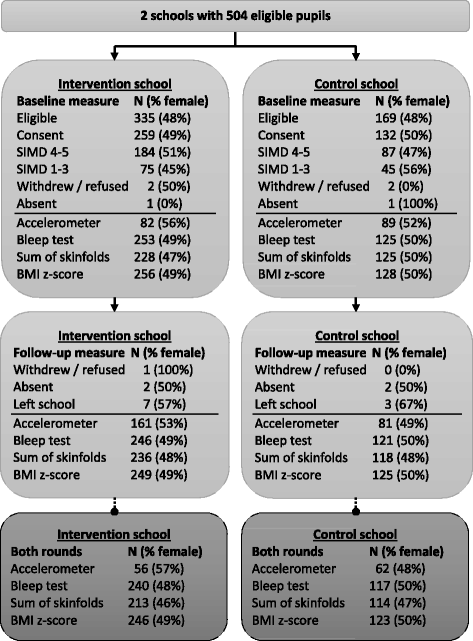The Daily Mile makes primary school children more active, less sedentary and improves their fitness and body composition: a quasi-experimental pilot study
- PMID: 29743076
- PMCID: PMC5944120
- DOI: 10.1186/s12916-018-1049-z
The Daily Mile makes primary school children more active, less sedentary and improves their fitness and body composition: a quasi-experimental pilot study
Abstract
Background: The Daily Mile is a physical activity programme made popular by a school in Stirling, Scotland. It is promoted by the Scottish Government and is growing in popularity nationally and internationally. The aim is that each day, during class time, pupils run or walk outside for 15 min (~1 mile) at a self-selected pace. It is anecdotally reported to have a number of physiological benefits including increased physical activity, reduced sedentary behaviour, increased fitness and improved body composition. This study aimed to investigate these reports.
Methods: We conducted a quasi-experimental repeated measures pilot study in two primary schools in the Stirling Council area: one school with, and one without, intention to introduce the Daily Mile. Pupils at the control school followed their usual curriculum. Of the 504 children attending the schools, 391 children in primary classes 1-7 (age 4-12 years) at the baseline assessment took part. The follow-up assessment was in the same academic year. Outcomes were accelerometer-assessed average daily moderate to vigorous intensity physical activity (MVPA) and average daily sedentary behaviour, 20-m shuttle run fitness test performance and adiposity assessed by the sum of skinfolds at four sites. Valid data at both time points were collected for 118, 118, 357 and 327 children, respectively, for each outcome.
Results: After correction for age and gender, significant improvements were observed in the intervention school relative to the control school for MVPA, sedentary time, fitness and body composition. For MVPA, a relative increase of 9.1 min per day (95% confidence interval or 95%CI 5.1-13.2 min, standardised mean difference SMD = 0.407, p = 0.027) was observed. For sedentary time, there was a relative decrease of 18.2 min per day (10.7-25.7 min, SMD = 0.437, p = 0.017). For the shuttle run, there was a relative increase of 39.1 m (21.9-56.3, SMD = 0.236, p = 0.037). For the skinfolds, there was a relative decrease of 1.4 mm (0.8-2.0 mm, SMD = 0.246, p = 0.036). Similar results were obtained when a correction for socioeconomic groupings was included.
Conclusions: The findings show that in primary school children, the Daily Mile intervention is effective at increasing levels of MVPA, reducing sedentary time, increasing physical fitness and improving body composition. These findings have relevance for teachers, policymakers, public health practitioners, and health researchers.
Keywords: Body composition; Children; Daily Mile; Fitness; Physical activity; Primary school.
Conflict of interest statement
Ethics approval and consent to participate
Ethical approval was obtained from the University of Stirling, School of Sport Research Ethics Committee (reference number 760). Approval was also obtained from the Director of Children, Young People and Education at Stirling Council. This study was performed in accordance with the Declaration of Helsinki.
Competing interests
The authors declare that they have no competing interests.
Publisher’s Note
Springer Nature remains neutral with regard to jurisdictional claims in published maps and institutional affiliations.
Figures


Comment in
-
Response to Daly-Smith et al.'s commentary on 'The Daily Mile makes primary school children more active, less sedentary and improves their fitness and body composition: a quasi-experimental pilot study'.BMC Med. 2019 May 22;17(1):97. doi: 10.1186/s12916-019-1336-3. BMC Med. 2019. PMID: 31113425 Free PMC article.
-
Commentary on a recent article on the effects of the 'Daily Mile' on physical activity, fitness and body composition: addressing key limitations.BMC Med. 2019 May 22;17(1):96. doi: 10.1186/s12916-019-1335-4. BMC Med. 2019. PMID: 31113451 Free PMC article.
References
-
- Stirling Council . The Daily Mile - Health and Wellbeing for free. 2015.
-
- Daily Mile roll out [https://news.gov.scot/news/daily-mile-roll-out]. Accessed 17 Apr 2018.
-
- Obesity: Children: Written question - 46791 [http://www.parliament.uk/business/publications/written-questions-answers...]. Accessed 17 Apr 2018.
-
- Early day motion 1074: Five Year Anniversary of Daily Mile [http://www.parliament.uk/edm/2016-17/1074]. Accessed 17 Apr 2018.
-
- The Daily Mile [http://thedailymile.co.uk/]. Accessed 17 Apr 2018.
Publication types
MeSH terms
Grants and funding
LinkOut - more resources
Full Text Sources
Other Literature Sources
Medical

